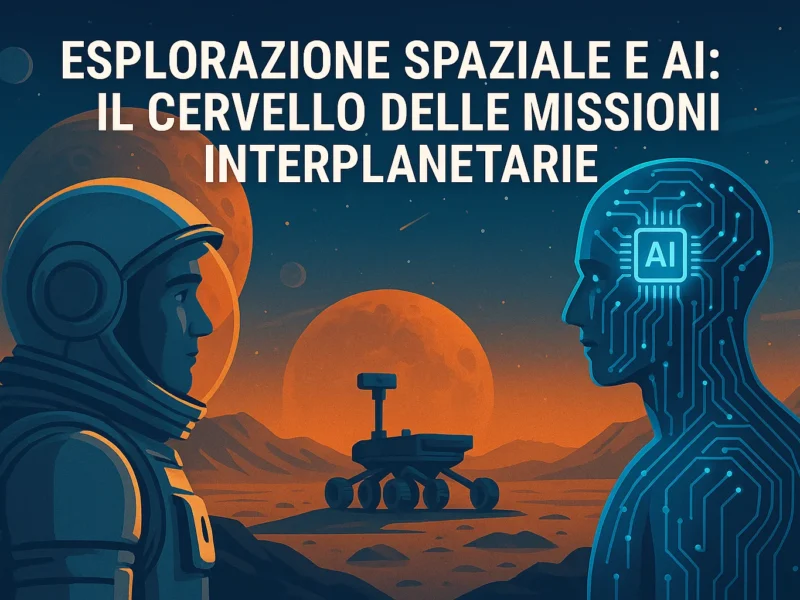Beyond Earth: when TO watch the stars
We have always looked at the sky with curiosity. But today, thanks to the artificial intelligence, we are exploring like never before. The space missions are more complex, risky and far. To address them, not just the most human ingenuity: it serves as an intelligence that can adapt, learn and decide for themselves. It is here that comes into play TO.
What does the AI space?
Artificial intelligence is now an integral part of the space missions modern. But what, exactly?
In summary, the AI allows the probes, rovers and satellites:
– analyze large amounts of data in real-time,
– detect anomalies and take autonomous decisions,
– optimize the energy consumption and the paths,
– adapt to unforeseen conditions, such as dust storms or sudden failures.
This is not only automation, but cognitive capacity distributed in space.
The artificial intelligence in the missions interplanetary
The first examples of AI in space date back to missions such as Mars Pathfinder (1997), but it is with the rover Spirit and Opportunity, and then Curiosity and Perseverancethat the use of artificial intelligence has become evident. These robot explorers are not limited to carrying out orders from the Ground: take autonomous decisionsfor example choosing rocks to be analyzed on the basis of the predictive models.
With the mission PerseveranceNASA introduced AutoNava system that allows the rover to plan the route to avoid obstacles. It's like having a co-pilot smart on Mars.
But it's not just NASA. Also ESA, JAXA and SpaceX they are developing models for navigation, resource management, and predictive maintenance.
When the space becomes really smart
One of the most spectacular examples is the project AI4Mars: an artificial vision system that teaches the rover to distinguish rocks, sand, and obstacles. Trained with thousands of images sent from Mars, it allows for a more secure and autonomous.
Satellites use AI to analyze earth imagery, detect forest fires, melting of ice or military movements. In practice, the space to “think” for us.
In our article Humanoid Robot explores the new frontiers of intelligent technology we have already dealt with it such as TO give the “mind” to the robot. But in space, the mind must also be resilient, adaptive, and tireless.
Artificial intelligence and future missions: the Moon, Mars and beyond
Both theThe European Space agency (ESA) the NASA are investing significantly in the integration of artificial intelligence to improve the range and efficiency of space missions. The ESA has launched in a laboratory dedicated to the TO the to the robotic missions and the crew, with the goal of using artificial intelligence in all aspects of exploration, from the training of the astronauts to the autonomous navigation of the rover.
👉 ESA – The power of AI in space exploration
Even NASA is testing advanced software for a possible future mission on Europe, one of the moons of Jupiter. These systems, based on AI, are designed to allow lander take autonomous decisionsovercoming the limitations of the delay in communications with the Ground.
👉 NASA TO for Jupiter's Moon Europa – Space.com
In an environment hostile and remote, the artificial intelligence is not just a tool. Becomes the presence of cognitive remote, able to represent, analyze data in real time and react to unexpected conditions, acting for us at a million miles away.
Frequently asked questions (FAQ)
The AI will replace astronauts?
No, but they will support more and more intelligent. In hostile environments, the AI can be “the senses and the mind” of the robot, leaving the humans of the critical tasks and strategic.
The artificial intelligence can make ethical decisions in the space?
Not yet. The AI can assess probability and data, but does not have a conscience. The ethical decisions remain human, but the speed and the distance to make it need a certain level of autonomy algorithms.
The AI can fail during a space mission?
Yes, as with every technology. That's why the systems are trained with extreme scenarios, and multiple levels of backup. But thanks to the AI, the margins of error are reduced constantly.
Conclusion: a brain among the stars
Space exploration is not only a technological challenge. It has become a challenge cognitive. In this scenario, the artificial intelligence represents our ally more powerful. A brain that takes us beyond the atmosphere, ready to decide when we can't.
And maybe one day, AI will be the first form of intelligence earth to set foot (or wheel) on the planets where we do not we will ever.
If this topic fascinates you, you can learn more in our article AI and the New Frontiers of Robotics, where we explore the role of AI in extreme environments and in constant evolution.
